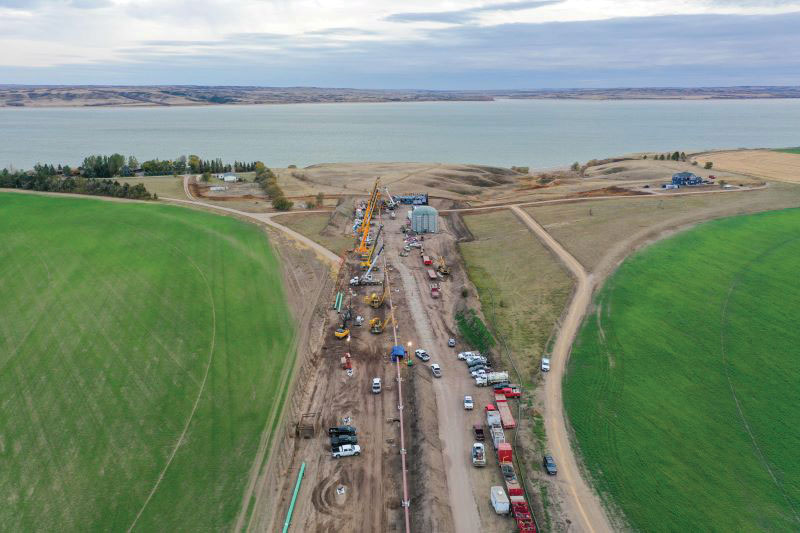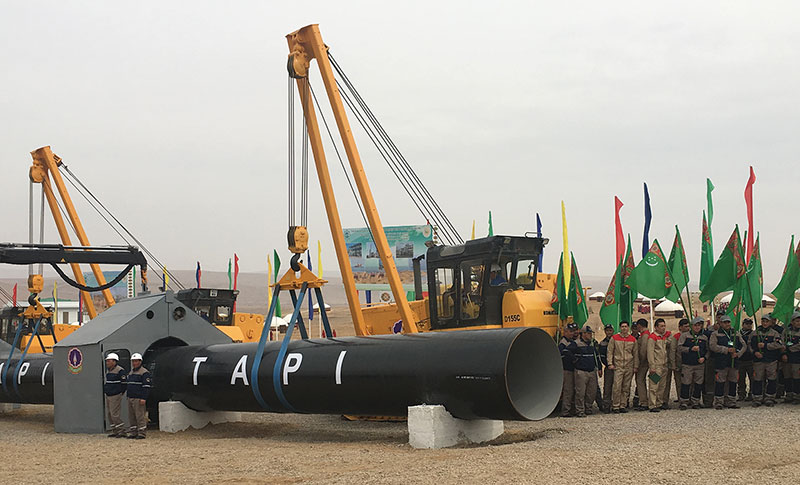December 2021, Vol. 248, No. 12
Projects
Michels Completes 15,000-Plus Foot HDD Crossing
Michels Completes 15,000-Plus Foot HDD Crossing

Michels completed a 15,426-foot (4,702-meter) horizontal directional drill (HDD) of a 24-inch pipe crossing Lake Sakakawea on the Missouri River in North Dakota, extending the limits of trenchless construction.
The crossing is part of a new pipeline being constructed from Tioga, North Dakota, to near Watford City, North Dakota.
The crossing is a critical element in the pipeline’s ability to deliver higher levels of natural gas associated with oil production from the Bakken and Three Forks Formations in Williston Basin, and to reduce the amount of natural gas that would otherwise need to be flared.
The HDD crossing of just under 3 miles (5 km) is one of the longest of its kind, surpassing by 3,174 feet (967 meters) a 20-inch HDD crossing Michels completed in the Bakken region in 2019. HDD minimized disturbances to the area and provided a delivery outlet for previously untapped energy sources in both instances.
Although the crossings are similar in location, length and technique, each project includes its own unique and awe-inspiring accomplishments.
Prior to pullback, Michels Pipeline, Inc. assembled the 15,426-foot pipeline into two sections – one of 426 feet (130 meters) and another of 15,000 feet (4,572 meters). When laydown space allows, long sections of pipe can be advantageous because they require fewer pull stoppages to weld pipe strings together.
Turkmenistan Officials Discuss Work on TAPI Gas Pipeline

Officials from Turkmenistan will visit Kabul to discuss continuing work on the TAPI pipeline linking the Central Asian country through Afghanistan to Pakistan and India, the Taliban government said.
The pipeline is expected to carry 1,165 Bcf (33 Bcm) of natural gas each year along a route stretching 1,125 miles (1,800 km) from Galkynysh, the world’s second-biggest gas field, to the Indian city of Fazilka near the Pakistan border.
“We have been working hard for some time and we are ready to take pride in starting work on the TAPI project,” Mohammad Issa Akhund, the acting minister of Mines and Petroleum in the new Taliban government, said in a statement.
The Afghan stretch of the pipeline will run from the northwestern border with Turkmenistan, south through the western city of Herat to Kandahar near the border with Pakistan.
The project was launched in Afghanistan in 2018 when the Taliban was fighting the Western-backed government in Kabul, but it pledged its cooperation for a project it hailed as a key future element of the economic infrastructure.
Russian Gas Flows to Germany Through Yamal Restart
Gas flows from Russia to Germany via the Yamal pipeline started up again in November, sending European gas prices lower.
Russian gas had not flowed to Germany via the pipeline for four days at the time. Instead, supplies were sent from Germany to Poland in a reversal that has sent European gas futures up as much as 23%.
Moscow has denied the switch occurred to bump up gas prices, saying it was meeting contractual obligations, which was confirmed by European companies contacted by Reuters.
British and Dutch gas prices for day-ahead delivery were both down by about 5%.
Russia has said it is concentrating on replenishing domestic stocks before releasing any more gas to Europe. It expects its own replenishment process to finish by Nov. 8.
Iraq: Pipeline to Jordan Needs to Cost Under $9 Billion
The Iraqi oil ministry said the cost of an oil pipeline to Jordan’s Aqaba port city should be brought under $9 billion for the project to go ahead.
Talks between Jordan and Iraq about the project have reached an “advanced stage,” it added in a statement.
Jordan and Iraq agreed to construct a pipeline to supply Jordan with crude oil and natural gas in 2012. The pipeline would carry crude oil to the Jordan Petroleum Refinery Company’s plant in Zarqa to meet Jordan’s needs and to the Aqaba Port for export purposes.
Texas Pipeline Operator Altus to Combine with BCP Raptor
Altus Midstream plans to merge with BCP Raptor, a holding company for pipeline assets in the Permian Basin owned by investment firms, with the combined entity valued at $9 billion inclusive of debt.
The reverse merger allows privately owned BCP to become a public company, with control of Altus going to private equity firm Blackstone Inc. and infrastructure investor I Squared Capital.
Altus will gain scale in the Permian, with the resulting company becoming the largest integrated midstream operator in the Delaware part of the formation, according to Altus.
BCP owns EagleClaw Midstream, Caprock Midstream and Pinnacle Midstream. It also holds part of the Permian Highway Pipeline, and once joined with Altus’ interest, they will be the majority owner of the 430-mile (700-km) natural gas pipeline.
Pipeline Rupture Halts Gas Flows from Bulgaria to Serbia
Bulgaria ceased shipping Russian natural gas to Serbia and Hungary after a pipeline rupture in the northeast of the Balkan country, state gas network operator Bulgartransgaz said.
The accident, near the village of Vetrino, automatically stopped gas flows briefly to Romania, too.
Bulgaria launched a 293-mile (474-km) gas pipeline in January to transport Russian gas from its southern border with Turkey to its western border with Serbia.
Bulgartransgaz Chief Executive Vladimir Malinov said there was “material damage” from the rupture, and the company was set to repair it once an on-site investigation was reported.
“We are ready to start replacing the affected pipes and repair the pipeline as soon as possible,” Malinov told Reuters, later adding repair teams would work all night.
TWI, Industry Evaluating Gas Pipelines for Hydrogen Transport
TWI joined forces with C-FER Technologies and the Sumitomo Corporation to launch a new joint industry project (JIP) with pipeline operators and line pipe manufacturers to evaluate the suitability of natural gas pipeline networks for transporting hydrogen.
The project will serve as the foundation for the development of best practices, industry code revisions and standards to allow the repurposing of existing natural gas pipeline systems for hydrogen transportation.
Repurposing existing pipelines in this way will help progress hydrogen as a key component in decarbonizing the energy industry as a replacement for traditional hydrocarbon fuel sources.
The project comprises four phases, including material assessments, small- and full-scale testing of pipeline material under continuous hydrogen exposure, and an evaluation of the impact of hydrogen on pipeline performance and the remaining service life of legacy pipeline systems.
Testing will be conducted at TWI’s laboratories in Cambridge and at C-FER’s facilities in Edmonton, Alberta, Canada.
Project analysis and test results will be used to determine how hydrogen service affects the safety, reliability and management of legacy pipelines, and will contribute to provincial, federal and international efforts to decarbonize and reduce greenhouse gas emissions across the global energy system.
Fuel Thieves Likely Responsible for Pemex Pipeline Blast
At least one person was killed, and more than a dozen were injured, five seriously, when a pipeline of state oil firm Petroleos Mexicanos (Pemex) exploded in the central Mexican state of Puebla after it was breached by suspected fuel thieves, authorities said.
Alerted to a gas leak, the Puebla state government said it had averted a higher death toll by evacuating residents from the site in the San Pablo Xochimehuacan municipality before three explosions occurred, wrecking between 30 and 50 homes.
Officials at a news conference said that within a radius of 0.62 miles (1 km) of the site, about 2,000 people were evacuated, and that the fire was quickly brought under control.
The blast is the latest deadly incident to affect Pemex’s infrastructure, and it follows a fire on one of the company’s oil platforms in August that killed at least five people.
Puebla’s governor, Miguel Barbosa, said the incident was sparked by a gas leak caused by an illegal fuel tap. Thanks to the speedy evacuations, a “tragedy of enormous proportions” was prevented, he added.
Fuel theft has led to a series of accidents in Mexico. Well over 100 people died due to an explosion triggered by an illegal pipeline tap in the neighboring state of Hidalgo in 2019, according to Reuters.
EIG Short-Listed as Possible Buyer for Aramco Gas Pipelines
U.S.-based energy investor EIG has been short-listed as a potential buyer of Saudi Aramco’s gas pipelines, part of a sale that could exceed $17 billion and is likely to be completed later this year, three sources told Reuters.
Aramco has approached investors, including those involved in buying a stake in Abu Dhabi National Oil Co.’s gas pipelines.
This was bought by a consortium including Brookfield, Global Infrastructure Partners (GIP), Singapore sovereign wealth fund GIC and European gas infrastructure owner and operator SNAM.
GIP told Reuters it will not bid for the Aramco gas pipelines but is looking at other assets in the region, where other oil-producing nations are looking to monetize assets as they transition to a post-oil era.
Aramco is talking to banks for a financing package, equivalent to roughly 80% of the final price, which will likely be underwritten by a small group of banks and will be offered to the bidders to back their purchase, sources have said.
Guyana Planning 135-Mile Subsea Pipeline for Gas-Fired Power Plant
Guyana’s government expects work to begin on a major gas-fired power plant next year, which will be constructed with the expectation of a 135-mile (220-km) pipeline also being built.
The pipeline would transport about 50 MMcf/d (1.4 MMcm/d) of gas from the company’s Liza Phases 1 and 2 oil projects.
Guyana will likely be one of South America’s top oil producers during the next four years, but this project is an example of the country also investing in natural gas, according to the Bloomberg report.
The project could improve the country’s electricity access since the electricity is currently expensive and unreliable because it is mostly generated by burning imported fuel oil and distributed through an aging transmission system.
Exxon Mobil’s offshore oil developments, which also contain natural gas, are of interest to the Guyana government for power generation.





Comments